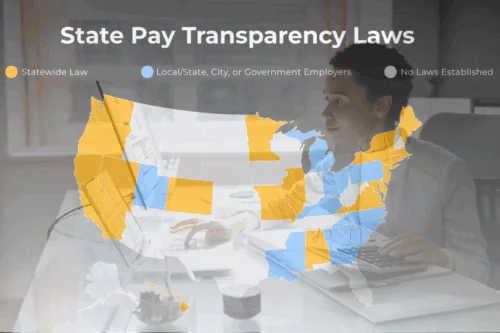Welcome to your guide on anti-discrimination laws in the workplace. Whether you are entering the job market for the first time or seeking to better understand your rights, this guide provides insights into navigating and benefiting from a discrimination-free workplace.
Why Understanding This Matters
Being aware of anti-discrimination laws is crucial in today’s diverse work environment. These laws protect you and ensure fair treatment, regardless of background, identity, or belief. Knowing these regulations can help you make informed decisions and take appropriate actions if necessary.
This guide aims to demystify the complexities of workplace rights and responsibilities under these laws, offering entry-level job seekers and seasoned professionals the knowledge to thrive in inclusive and respectful workplaces. Let’s understand how these laws function and why they’re pivotal for a balanced and equitable work culture.
Understanding Anti-Discrimination Laws in the Workplace
Anti-discrimination laws in the workplace are crucial in ensuring fair treatment for all employees regardless of their background or personal characteristics. These laws protect employees from unjust treatment based on specific protected categories such as race, gender, age, disability, etc. Understanding these laws is the first step toward creating an inclusive work environment.
Protected Categories Under Anti-Discrimination Laws
Various federal, state, and local laws outline protections for different classes. The main categories typically include:
- Race and Color
- Sex and Gender Identity
- Age (for individuals 40 and older)
- National Origin
- Religion
- Disability Status
Key Federal Laws
The cornerstone of anti-discrimination law in the United States is the Civil Rights Act of 1964, particularly Title VII, which prohibits employers from discriminating based on race, color, religion, sex, or national origin. Other critical statutes include:
- The Age Discrimination in Employment Act (ADEA)
- The Americans with Disabilities Act (ADA)
- The Genetic Information Nondiscrimination Act (GINA)
You might want to explore the Guide to Inclusive and Supportive Opportunities for deeper insights into creating supportive workplace dynamics.
State and Local Laws
State and local governments might offer additional protections. For instance, some states include protections for sexual orientation and gender identity that extend beyond federal statutes. Employees should inquire about and understand the specifics that apply in their respective states.
Widening your understanding of anti-discrimination laws is essential for compliance and cultivating a workplace culture of inclusion and respect. For further reading on federal anti-discrimination laws, visit the Equal Employment Opportunity Commission’s official website.
Critical Types of Discrimination Prohibited by Law
To promote a better work environment, it’s vital to recognize the various forms of discrimination that anti-discrimination laws address. These laws help prevent unfair treatment and ensure equality in the workplace.
Common Forms of Discrimination
- Sexual Harassment: Unwanted sexual advances or behavior that disrupts a person’s work environment.
- Racial Discrimination: Unequal treatment based on race or ethnicity that affects employment decisions.
- Disability Discrimination: Failure to accommodate employees with disabilities as required by the Americans with Disabilities Act (ADA).
- Age Discrimination: Prejudice against employees who are 40 years old or older, especially in hiring, promotions, or layoffs.
- Religious Discrimination: Inadequate accommodation of an employee’s religious practices or unfair treatment based on their religious beliefs.
Handling Discrimination
Understanding how to handle discrimination effectively is crucial. Employees should report discrimination incidents to their human resources department or relevant authorities. Additionally, awareness of one’s rights under the law, such as the right to file a complaint without retaliation, is essential for prevention and resolution.
For a more comprehensive understanding of navigating discrimination issues and interviews, check Handling Diversity Interview Questions with Confidence.
Preventive Measures
Employers can also play a significant role in preventing discrimination by:
- Developing clear anti-discrimination policies.
- Conducting regular training sessions on diversity and inclusion.
- Ensuring fair treatment in all aspects of employment.
Enhancing awareness and understanding of employment discrimination laws can help create a work environment that is both fair and respectful.
Roles and Responsibilities Under Anti-Discrimination Laws
Both employers and employees have distinct roles in upholding anti-discrimination laws in the workplace. A clear understanding of these responsibilities ensures a respectful and equitable work environment.
Employer Responsibilities
Employers must adhere to several critical duties:
- Provide a safe, discrimination-free workplace.
- Implement policies that prevent discriminatory practices.
- Train management and staff on these policies and laws.
- Handle complaints promptly and effectively.
- Absolutely no retaliation against anyone who files a complaint.
Employee Duties
Employees also contribute to maintaining a non-discriminatory workplace:
- Understand and follow the established workplace policies.
- Report incidents of discrimination they experience or witness.
- Support co-workers who may be facing discrimination.
- Respect diversity and encourage inclusivity among peers.
Employees and employers can explore additional resources through the EEOC’s small business resources to further enhance understanding. This page offers guidance on smaller enterprises’ duties and responsibilities regarding anti-discrimination laws.
Furthermore, consider reviewing the strategies in the Guide to Inclusive Hiring: Strategies for a Diverse Workplace for insights into creating a more inclusive hiring process that is aligned with anti-discrimination laws.
Challenges and Legal Cases in Anti-Discrimination Practices
While anti-discrimination laws in the workplace aim to create equality, implementing these laws can present various challenges. Examining legal cases helps illuminate these hurdles and the necessary steps to overcome them.
Common Challenges
Several issues frequently arise when attempting to enforce anti-discrimination laws:
- Ambiguities in-laws lead to irregular applications.
- Limited resources for enforcement agencies.
- Difficulty in proving discrimination cases.
- Retaliation fears prevent complaint filings.
Notable Legal Cases
Historical and recent legal cases serve as important lessons in anti-discrimination practices:
- Griggs v. Duke Power Co. (1971): Established that employment practices must be fair in intention and outcome.
- Meritor Savings Bank v. Vinson (1986): Recognized hostile work environment as sexual harassment under Title VII.
- Ricci v. DeStefano (2009): Addressed the complexities of affirmative action and its impact in the workplace.
Each case has shaped the application of anti-discrimination laws, informing both policy and practice in the workplace.
Ensuring Compliance with Anti-Discrimination Laws
Ensuring compliance with anti-discrimination laws in the workplace is key for legal and ethical business operations. Employers must actively uphold these laws to foster an inclusive work culture.
Key Compliance Strategies
Employers can employ several effective strategies to ensure adherence to these laws:
- Regularly update discrimination policies and procedures.
- Train employees and management thoroughly.
- Monitor workplace practices and address issues promptly.
- Conduct annual reviews of compliance measures.
Also, using tools from credible sources can aid in compliance. For instance, the Department of Labor offers compliance assistance to help businesses understand their obligations under the law.
Audit and Feedback
Auditing company practices and gathering employee feedback are essential:
- Conduct audits to ensure policies are being followed.
- Use surveys to understand employee experiences and perceptions.
- Act on feedback to improve practices continuously.
Adhering to anti-discrimination laws helps avoid legal ramifications and enhances the workplace environment, making it more welcoming for all employees. It underscores an organization’s commitment to fairness and equality.
Exploring Inclusive Hiring Strategies for a Diverse Workplace can provide valuable insights for organizations aiming for broader inclusion.
Moreover, for specific questions about compliance strategies, visiting EEOC’s small business resource proves beneficial in navigating these legal obligations.
Benefits of Adhering to Anti-Discrimination Laws
Complying with anti-discrimination laws in the workplace brings numerous benefits and enhances work culture. Understanding these advantages can motivate businesses to prioritize these practices.
Positive Work Environment
Adherence to anti-discrimination laws significantly contributes to a positive work atmosphere:
- Encourages respect and equality among employees.
- Reduces conflicts and builds better teamwork.
- Promotes a sense of security and belonging.
Increased Productivity
Maintaining a discrimination-free workplace directly impacts productivity:
- Employees perform better when they feel respected and valued.
- Diverse teams are often more creative and innovative.
Enhanced Company Reputation
Commitment to anti-discrimination policies strengthens a company’s reputation:
- Attracts top talent who value inclusivity.
- Improves customer perception and broadens market reach.
- Inspires trust and loyalty in both employees and clients.
The article Experts Weigh in on Workplace Diversity further explores the importance of maintaining diverse teams and provides extensive insights into creating environments that thrive on respect and equality.
Additionally, keeping up to date with the ongoing changes in anti-discrimination laws ensures that organizations remain compliant and avoid potential legal issues, making the workplace better for everyone involved.
How to Report a Discrimination Incident
Knowing how to report discrimination effectively is critical to enforcing anti-discrimination laws in the workplace. It empowers employees and ensures issues are addressed promptly and appropriately.
Steps to Report Workplace Discrimination
If you believe you’re experiencing or witnessing discrimination at work, follow these steps:
- Document the Incident: Record what happened, including dates, times, and witnesses.
- Report to Human Resources: Submit your complaint to your HR department. If HR is unavailable or involved, find a higher authority within the organization.
- File a Complaint with the EEOC: If internal resolution isn’t successful, you can file a formal complaint with the Equal Employment Opportunity Commission (EEOC).
Resources for Filing a Report
Various resources are available to help you navigate the reporting process:
- The EEOC’s website provides guidelines on how to file a charge of employment discrimination.
- Local anti-discrimination agencies and legal aid organizations can offer assistance and guidance.
Review the Handling Diversity Interview Questions with Confidence to understand better your rights and the process of handling discrimination scenarios.
By ensuring that all reports of discrimination are handled with diligence and care, workplaces can uphold the values of fairness and respect central to anti-discrimination laws.
FAQs
What exactly is workplace discrimination?
Workplace discrimination occurs when an employee or job applicant is treated unfavorably because of race, skin color, national origin, gender, disability, religion, or age.
Is it discrimination if it happens only once?
Yes, a single incident can count as discrimination, especially if it creates a hostile work environment or leads to a significant employment decision like termination.
What should I do if I witness discrimination?
Report the incident to your HR department or direct supervisor unless they are involved. Documentation can strengthen your position.
How can employers prevent discrimination?
Employers can prevent discrimination by implementing effective training programs, maintaining solid anti-discrimination policies, and promptly addressing complaints.
Can small businesses be exempt from anti-discrimination laws?
Most anti-discrimination laws apply to businesses with a certain number of employees, typically 15 or more, but it’s important to know local laws that might have stricter requirements.
What is the deadline for filing a discrimination claim?
For most federal claims, you have 180 days from the day of the incident to file a complaint with the EEOC; this extends to 300 days if a state or local agency enforces a law that prohibits discrimination on the same basis.
Are intern and part-time workers protected under anti-discrimination laws?
Yes, interns and part-time workers are protected under federal anti-discrimination laws and should receive the same protection as full-time employees.
What are the consequences for employers violating anti-discrimination laws?
Violations can result in legal penalties, including compensatory and punitive damages, and can severely damage an employer’s reputation.
Conclusion
Understanding and complying with anti-discrimination laws in the workplace is not only a legal obligation but also an ethical one. By embracing these laws, employers promote a fair, inclusive, and productive work environment that benefits everyone. Furthermore, employees aware of their rights are empowered to contribute positively and thrive in their respective roles.
Join the Movement
We encourage you to join Diversity Employment and upload your resume today! Join a diversity job board platform dedicated to promoting inclusive hiring and supportive workplaces. By becoming part of our community, you gain access to resources, job opportunities, and a network of employers committed to diversity and equality.
Together, we can build a workplace where everyone, regardless of their background, has the opportunity to succeed. Join Diversity Employment today and be a part of change that fosters innovation and inclusivity in professional environments nationwide.




